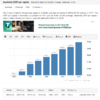All the signs are pointing towards an inevitable Australian recession sometime this year as the Corona virus hits an already weak, Chinese dependent economy. So how does Australia deal with this one?
Labor avoided recession during the GFC off the back of an unprecedented stimulous package that is both applauded by some, or blamed by others for Australia's poor economic performance since.
Further stimulous may well keep us out of recession at cost of increasing our already historically high debt, or do we allow the recession to run its course 1990's style in which the underlying market forces (high interest rates) effectively corrected themselves (and which was immediately followed by the booming Howard era). Thoughts?
Labor avoided recession during the GFC off the back of an unprecedented stimulous package that is both applauded by some, or blamed by others for Australia's poor economic performance since.
Further stimulous may well keep us out of recession at cost of increasing our already historically high debt, or do we allow the recession to run its course 1990's style in which the underlying market forces (high interest rates) effectively corrected themselves (and which was immediately followed by the booming Howard era). Thoughts?
Last edited:





